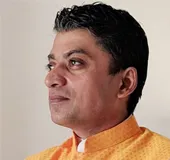-
CENTRES
Progammes & Centres
Location
The resurgence of God and Christian good in the Russia-Ukraine conflict narrative points to a deeper fissure than just ideology between the West and its adversaries

“God is dead,” lamented Nietzsche on the deep churning of European collective intellect away from organised religion during the Age of Enlightenment, and the subsequent evolution of western sensibilities. However, the vicissitude of the eras is not beholden to human intellect and agency. It, instead, follows its own cycle of eternal recurrence, as God and the binary between good and evil—central to western theological architecture—stages a comeback into western political sensibility and agency.
At the forecourt of Warsaw’s historic Royal Castle, President Biden’s impassioned speech invoking God and the Pope drew upon this moral binary. He appeals to like-minded nations to band together to resist Putin and his administration, who—with the violence and suffering they unleashed upon a hapless people—Biden situates as the moral opposite. The signalling in the choice of setting was unmistakable. Rebuilt after being bombarded, stripped bare and razed to the ground by the Nazis during WW2, Warsaw’s Royal Castle represents resistance and resurrection in the face of great odds, which aligns to the current Ukrainian national spirit.
Days earlier, speaking at a massive rally in Moscow’s fabled Luzhniki stadium to mark the 8th anniversary of the Crimean annexation, Putin paraphrased from the Bible, “There is no greater love than to lay down one’s life for one’s friends.” The verse is lifted from Jesus’s discourse the night before his crucifixion, reflective of his choosing to bear the sins of people upon himself—a willing sacrifice—on the cross. Like Judas Iscariot who betrayed Jesus, Putin’s posit of the West’s purported betrayals and cunning against his country, makes him and his people a victim in his imagination rather than a perpetrator. In this way, Putin justifies the morality of his current agency, no matter how sordid.
Like Judas Iscariot who betrayed Jesus, Putin’s posit of the West’s purported betrayals and cunning against his country, makes him and his people a victim rather than a perpetrator
While faith has played an important role in American political enterprise for over a century-and-a-half from the early days of the civil war, religiosity gained particular traction as an important component of self-identity during the Cold War, setting America apart from the godless Soviets.
President Reagan’s famous ‘Evil Empire’ address to the National Association of Evangelicals on the 8th of March in 1983, not only reinforced his anti-Communist credentials among his restive political constituency but also cast the Cold War as a moral rather than a political or ideological issue. Rejecting moral equivalence, Reagan asserted that freedom and democracy were endowments from God, and in denying them, the totalitarian Communists situated themselves at the other end of the moral spectrum, thereby, making the Cold War a conflict between the forces of good and the forces of evil.
Gilbert Achcar in his book The Clash of Barbarisms argues that operating behind the veneer of morality and religiosity are the darker and barbaric sides of civilisation—where nation states compete for influence and space in a Hobbesian world order, inducing a spiral of violence, destruction and mutual ruination. The invocation for divine protection and victory of the self hides an insidious and unsaid corollary– the destruction and annihilation of the other, upon which such a victory is premised.
Wars are no longer just about fighting in remote battlegrounds against faceless enemies, but are every bit a drawing room phenomenon to capture the hearts and minds of audiences by seizing the media narrative. Media, then, becomes the amplifier of state policy and a weapon to achieve geopolitical objectives. Through a potent mixture of curated information and disinformation, media seeks to elicit specific responses from its audiences and demoralise the adversary.
Wars are no longer just about fighting in remote battlegrounds against faceless enemies, but are every bit a drawing room phenomenon to capture the hearts and minds of audiences by seizing the media narrative.
From news and images of destruction, indiscipline and mutiny, salacious personal attacks, manufactured controversies bordering on the bizarre, to claims of domestic dissent and glorifying mercenary combatants—which portends a worrying trend as the Afghan experience shows—western media’s storytelling has been decidedly one-sided, with Russia being arraigned in the court of western public opinion.
Russia, on the other hand, presents a study in contrasts. Despite the state-controlled media predictably toeing the government’s line, private news outlets have exhibited reasonable independent agency and the internet remains relatively open, giving the ordinary Russian access to multiple perspectives. Yet, independent surveys indicate that not only do a majority of Russians support the war in Ukraine, but Putin’s own ratings at home have also scaled multiyear highs, contrary to the carefully constructed narrative of domestic dissent western media has tried to portray.
The two-faced reality of conflict is complex and has gotten lost in the battle of the bytes, and both realities need to be confronted to make space for genuine dialogue. However, political discourses framed through the prisms of religiosity and moral absolutism, though politically expedient, are deeply problematic. It not only absolves the responsibility of the self but also denies agency to the other and dissipates the space for reason—both critical aspects in finding meaningful middle ground. The belief in the intrinsic benevolence of the self, views the expansion of the self’s power and influence as the extension of the self’s benevolence—making it a necessary moral duty to deliver subjugated populations from their despair and suffering.
Viewed from this lens, the competing other becomes the moral adversary, whose ability to deny the benevolence the self makes it evil. Such moral justification offers the motivation and veneer for advancing the interests of the self at the cost of the different other, leading to conflict and confrontation. For the West, its relentless expansion eastwards to bring “freedom” and “liberal values” to subjugated masses offers the moral justification for its larger geopolitical intent of expanding influence on the cheap, creating an arc of conflict at its ever enlarging frontline. Lest it be forgotten, it was one such ‘benevolent’ urge to ‘civilise’ that led to colonialism—the greatest subjugation in recorded history, which has forever changed national psyches.
“To say of what is that it is, and of what is not that it is not, is true,” said Aristotle in Metaphysics. The truth—which at all times remains absolute, no matter which side of the divide one stands in the current crises—is that a deep psychological scar will permanently imprint the psyche of the generation exposed to this conflict, where countless innocents who have no skin in the game have lost their lives at the altar of big power ego. Children, their fathers; wives, their husbands; mothers, their sons; and nations their denizens whose collective enterprise would have created a better tomorrow for all of us.
The views expressed above belong to the author(s). ORF research and analyses now available on Telegram! Click here to access our curated content — blogs, longforms and interviews.

Jaibal is Vice President and Senior Fellow of the Observer Research Foundation (ORF), India’s premier think tank. His research focuses on issues of cross cultural ...
Read More +